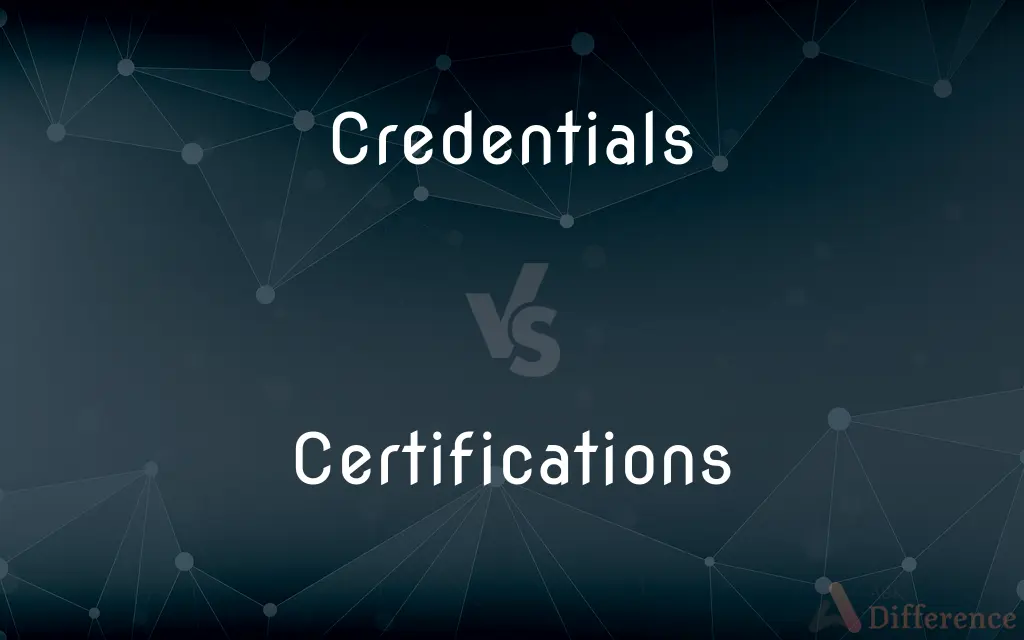Credentials vs. Certifications — What's the Difference?
Edited by Tayyaba Rehman — By Fiza Rafique — Published on November 2, 2023
Credentials are documents proving one's identity or qualifications, while Certifications are formal documents attesting to one's skills in a specific area.

Difference Between Credentials and Certifications
Table of Contents
ADVERTISEMENT
Key Differences
Credentials often refer to a broad category of documents or things that confirm a person's identity, qualifications, or experience. On the other hand, Certifications are specific acknowledgments provided by a professional body, often after passing an exam or meeting certain criteria, that validate expertise in a particular field.
Credentials can encompass various forms of identification, including driver's licenses, passports, or any document that proves an individual's capability or status. In contrast, Certifications are often related to professional advancement, showcasing a person's dedication to career development and their mastery in a particular industry or skill set.
While Credentials may not necessarily require formal testing or ongoing education, Certifications typically demand a demonstration of competency—often through examinations, practical applications, or continued learning to maintain the certification status.
Credentials are usually the overarching term for all documents proving a person's background, authority, or competency, whether in academic, professional, or other contexts. Certifications, however, are credentials with a narrow scope, specifically indicating that a person has undertaken training and assessment related to a specific skill or occupation.
The value of Credentials can vary widely depending on the context, ranging from basic identification to high-level qualifications. Certifications, by their nature, are designed to add value to a professional profile by indicating specialized knowledge or skills that are recognized and sometimes required in certain industries.
ADVERTISEMENT
Comparison Chart
Definition
Documents proving identity or qualifications
Documents attesting to skills in a specific area
Scope
Broad, various areas
Narrow, industry or skill-specific
Acquisition
Through experience, education, or identity verification
Through assessments, exams, or courses
Maintenance
Generally static
May require renewal through continued education or assessment
Use
Identification, general qualification
Professional advancement, specialization
Compare with Definitions
Credentials
Documents that verify a person's identity.
He showed his passport as Credentials at the airport check.
Certifications
Documents proving someone's skill or knowledge in a particular area.
She earned several software development Certifications.
Credentials
Any form of verification used to prove authority or competency.
The job required specific Credentials, including a Master's degree and bilingual fluency.
Certifications
Documents that attest to the completion of certain training programs.
The emergency response team had Certifications in CPR and First Aid.
Credentials
Documents that attest to one's status or achievements.
Before the lecture, the professor's Credentials were displayed on the screen.
Certifications
Official documents that validate one's abilities and knowledge in a specialized area.
Her Certifications made her an ideal candidate for the forensic accounting position.
Credentials
Proof of someone's qualifications or background.
Her educational Credentials were impressive and extensive.
Certifications
Acknowledgments from a professional body of meeting certain criteria.
After many hours of study, she finally received her language teaching Certifications.
Credentials
That which entitles one to confidence, credit, or authority.
Certifications
Formal recognitions of one's professional competency.
His Certifications were prominently displayed in his office.
Credentials
Credentials Evidence or testimonials concerning one's right to credit, confidence, or authority
The new ambassador presented her credentials to the president.
Certifications
The act of certifying.
Credentials
To supply with credentials
"trained, professional, credentialed child care" (Lee Salk).
Certifications
The state of being certified.
Credentials
Plural of credential
Certifications
A certified statement.
Credentials
Documentary evidence of someone's right to credit or authority, especially such a document given to an ambassador by a country.
Certifications
Plural of certification
Credentials
Login data
Credentials
A document attesting to the truth of certain stated facts
Credentials
Items or documents used to authenticate one's right to access, control, or authority over something.
He entered his Credentials into the website to access the subscriber content.
Common Curiosities
What makes Credentials different from Certifications?
Credentials validate identity or qualifications broadly, while Certifications affirm specific skills or knowledge.
Are Certifications considered Credentials?
Yes, Certifications are a specific type of Credentials, usually related to professional skills.
Who typically issues Certifications?
Professional or educational organizations, or industry-specific regulatory bodies.
Can Credentials impact employment opportunities?
Absolutely, certain Credentials can significantly enhance job prospects or promotions.
Do all jobs require Certifications?
No, but certain industries highly value or require specific Certifications for advanced roles.
Do online courses offer Certifications?
Many do, especially those related to professional skills development.
Do all professionals need Credentials?
Most do, in some form, whether they are educational, experiential, or identification-related.
How often do Certifications need renewal?
It varies; some require renewal with ongoing education, others are for a lifetime.
Why are Certifications important in the job market?
They demonstrate a proven level of expertise and commitment to professional development.
Can Credentials include educational degrees?
Yes, educational degrees are key examples of academic Credentials.
What's the importance of having Credentials?
They provide verification of one's identity, qualifications, or authorization.
Are Certifications internationally recognized?
Some are, especially those issued by internationally renowned bodies or institutions.
What's the most valued aspect of Certifications?
They validate the holder's specialized skill set, ensuring competency and reliability in their field.
Are Credentials only related to professional experience?
No, they can also relate to educational achievements, identity, or other qualifications.
Can Credentials be revoked?
Some can, especially in professional or legal contexts due to misconduct or fraud.
Share Your Discovery

Previous Comparison
Miami vs. Miami Beach
Next Comparison
Wellbeing vs. Well-beingAuthor Spotlight
Written by
Fiza RafiqueFiza Rafique is a skilled content writer at AskDifference.com, where she meticulously refines and enhances written pieces. Drawing from her vast editorial expertise, Fiza ensures clarity, accuracy, and precision in every article. Passionate about language, she continually seeks to elevate the quality of content for readers worldwide.
Edited by
Tayyaba RehmanTayyaba Rehman is a distinguished writer, currently serving as a primary contributor to askdifference.com. As a researcher in semantics and etymology, Tayyaba's passion for the complexity of languages and their distinctions has found a perfect home on the platform. Tayyaba delves into the intricacies of language, distinguishing between commonly confused words and phrases, thereby providing clarity for readers worldwide.











































